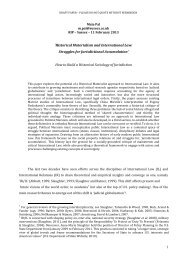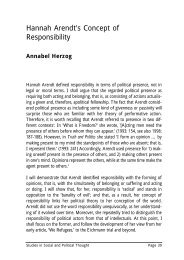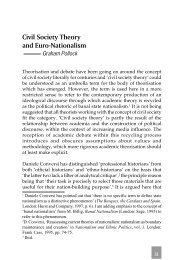Foreign Policy Analysis
Foreign Policy Analysis
Foreign Policy Analysis
Create successful ePaper yourself
Turn your PDF publications into a flip-book with our unique Google optimized e-Paper software.
<strong>Foreign</strong><br />
<strong>Policy</strong><br />
<strong>Analysis</strong><br />
Dr Stefanie Ortmann
Course Description<br />
Who acts in international relations, and why? All too often, in IR theory the<br />
answer seems to be states, or other collective actors, with their interactions<br />
determined by the logic of broad systemic forces. This however leaves out a<br />
lot of factors: does is matter whether these states are democracies or<br />
dictatorships, who is taking the decision to act and why? <strong>Foreign</strong> policy<br />
analysis breaks up the ‘black box’ of the state and looks at the way that the<br />
domestic environment and indeed the individual decision maker matters.<br />
<strong>Foreign</strong> policy making is a messy, sometimes political process, and 'the<br />
national interest' is by no means as clear and uncontested as foreign policy<br />
elites would like to make out. The course draws on classical and critical<br />
literature in foreign policy analysis to explore the broad tension between<br />
agency and structure (domestic and international) in international politics.<br />
It asks how decision-making in international politics may be less than<br />
rational, for a variety of reasons; how lobby groups and (perhaps) public<br />
opinion may influence foreign policy, and whether foreign policy can ever be<br />
ethical. The course will conclude with a look at the contemporary foreign<br />
policies of selected states.
Learning Objectives<br />
• By the end of this course, you will be able to:<br />
(i) identify, understand and critically evaluate a variety of<br />
theoretical approaches to the analysis of foreign policy;<br />
(ii) Identify key empirical issues in the contemporary<br />
foreign policy of selected states and relate them to<br />
theoretical accounts of how foreign policy is produced and<br />
implemented;<br />
(iii) Practice and improve your critical reasoning and<br />
argumentation skills by writing an empirically and<br />
theoretically informed essay and participating in class<br />
discussions;
Course organisation<br />
• The course is organized in two parts:<br />
• A first part is theory- and issue-oriented and introduces<br />
key issues in the analysis of foreign policy: agency versus<br />
structure in foreign policy making, what is the ‘national<br />
interest’? the foreign policy making process and the ‘art of<br />
muddling through’, whether or not decision making is<br />
rational, the influence of cultural factors, does the<br />
domestic political context and type of regime matter, and<br />
the ethics of foreign policy<br />
• A second part looks at the contemporary foreign policies<br />
of selected states.
Classes<br />
• The course is taught by a 2h seminar per week, with short<br />
lecture presentations, group discussion and analytical<br />
exercises.<br />
• Learning materials will include policy documents and other<br />
primary sources as well as academic material.<br />
• You are required to:<br />
• Attend every seminar<br />
• Read – at a minimum – the required weekly readings and<br />
formulate questions based on these readings that you’d like to<br />
have discussed in class<br />
• Write a final research essay, with a question that you agree<br />
with me during the course.
Assessment Criteria<br />
• The course is formally assessed by a final essay of 5000w<br />
• In order to prepare for this essay, I will ask you to hand in an essay<br />
outline by week 8 of the spring term. This is not formally assessed, but I<br />
will provide written feedback on your basic argument and structure. It<br />
is an opportunity for you to try out some of your ideas before you will<br />
actually be marked on them. As always, the more you put into this<br />
exercise, the more useful the feedback I provide will be.
Questions?<br />
You can email me about the course at s.ortmann@sussex.ac.uk
















